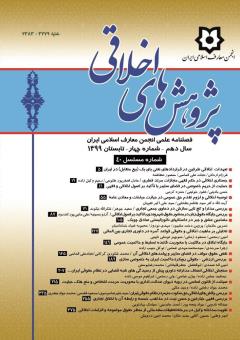نقض حقوق مولف در فضای سایبر و پیامدهایاخلاقی آن
محورهای موضوعی : Ethics and Islamic Educationمحمد شکوری گرکانی 1 , نجاد علی الماسی 2
1 - واحد علوم و تحقیقات، دانشگاه آزاد اسلامی
2 - دانشگاه آزاد اسلامی, تهران
کلید واژه: حقوق اخلاقی, پیامدهای اخلاقی, صلاحيت قضايي, كپي رايت, نقض,
چکیده مقاله :
در عرفان اسلامی، یکی از مهم ترین حقوق افراد، امانت داری و حفظ حق و حقوق طرفین است. يكي از مهمترين حقوق مؤلفان، حقوق اخلاقي آنها محسوب ميشود. با وجود اين، انتشار آثار تحت حمایت قانون در سطح جهانی در فضای سایبری کاملاً فراگیر شده است. آثاری نظیر فیلم ها، ضبط و نمایش موسیقی و متون علمی، قابل ارسال به همه جای جهان است و در دنیای امروز نیازمند بررسی عرفانی بیشتری در این زمینه نیاز میشود. تکثیر آثار در دیتابیس واقع در کشورهای خارجی و در دسترس عموم قرار دادن آثار فکری به وسیله ارائه دهندگان خدمات آنلاین یکی از بزرگترین چالش های موجود حقوقی به شمار می رود. اعمال ناقض حقوق اخلاقي مؤلف بدون در نظر گرفتن مراتب عرفانی آن می تواند به طور پیوسته در کشورهای مختلف انجام پذیرد. به دلیل اینکه دسترسی به شبکه دیجیتال در سراسر جهان امکان پذیر بوده و به گیرندگان و انتقال دهندگان غیرقانونی آثار فکری چنین امکانی را می دهد، تعیین محلی که آثار فکری و هنری در آنجا تولید، تکثیر یا نقض می شوند بسیار دشوار است. در اسناد بين المللي، تعیین دادگاه صالح موکول به تعیین محل وقوع نقض حقوق اخلاقي شده است. اما به نظر ميرسد با توجه به فرامكان بودن فضاي سايبر، اين معيار ناكارآمد است و همچنین نیاز به بررسی بیشتری در عرفان اسلامی دارد. لذا در این مقاله با به كارگيري روش پژوهش كتابخانهاي با توجه به محل فعاليت ارائه دهندگان خدمات اينترنتي، معيار جديدي براي تعيين دادگاه صالح و تبيين آن در عرفان اسلامی ارائه شده است.
In Islamic mysticism, one of the most important rights of individuals is the trusteeship and protection of the rights of the parties. One of the most important rights of authors is their moral rights. Nonetheless, law-enforcement works worldwide have become increasingly cyberspace. Works such as films, recording and display of music and scientific texts, can be sent to all over the world, and in today's world, more mystical study is required. Duplication of works in databases located in foreign countries and publicly available intellectual works by online service providers is one of the greatest legal challenges. The violations of moral rights of the author, regardless of their mystical levels, can be carried out continuously in different countries. Because digital access to the digital universe is possible and makes it possible for recipients and traffickers of intellectual works to do so, it is very difficult to locate the works of art and art there where they are produced, reproduced or violated. In international documents, the determination of the competent court has been made to determine where the violation of moral rights has been committed. But it seems that this criterion is ineffective due to the crampiness of the cyber space, and also needs to be further explored in Islamic mysticism. Therefore, in this paper, using a library research methodology based on the place of activity of Internet service providers, a new criterion for determining the competent court and its explanation in Islamic mysticism is presented.
